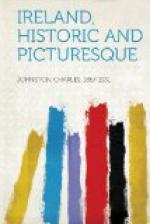We sea, therefore, that for full eight years, from the beginning of 1642 to the close of 1649, Ireland had an independent national government, with a regularly elected Representative Assembly, and a central authority, the Supreme Council, appointed by that Assembly, with judges going circuit and holding their courts regularly, while the Supreme Council held a state of almost regal magnificence, and kept several armies continuously in the field. While Owen Roe O’Neill lived, that part of the army under his command was able not only to secure an unbroken series of victories for itself, but also to retrieve the defeats suffered by less competent commanders, so that at his death he was at the summit of power and fame. If regret were ever profitable, we might well regret that he did not follow the example of the great English commander, his contemporary, and declare himself Lord Protector of Ireland, with despotic power.
After his death, the work he had done so well was all undone again, in part by treachery, in part by the victories of Oliver Cromwell. Yet ten years after the Lord Protector’s arrival in Ireland, his own work was undone not less completely, and the Restoration saw once more enthroned every principle against which Cromwell had so stubbornly contended.
XIV.
The Jacobite wars.
A.D. 1660-1750.
The Restoration saw Cromwell’s work completely undone; nor did the class which helped him to his victories again rise above the surface. The genius of the Stuarts was already sowing the seeds of new revolutions; but the struggle was presently to be fought out, not between the king and the people, but between the king and the more liberal or more ambitious elements of the baronial class, who saw in the despotic aspirations of the Stuarts a menace to their own power.
These liberal elements in England selected as their champion Prince William of Nassau, before whose coming the English king found it expedient to fly to France, seeking and finding a friend in that apostle of absolutism, Louis XIV. We have already seen how the interests of the feudal lords of Ireland, with the old Norman families as their core, drew them towards the Stuarts. The divine right of the landowner depended, as we saw, on the divine right of kings; so that they naturally gravitated towards the Stuarts, and drew their tenants and retainers after them. Thus a considerable part of Ireland was enlisted on the side of James II, and shared the misfortunes which presently overtook him—or in truth did not overtake him, as the valiant gentleman outran them and escaped. Nothing is more firmly fixed in the memories of the whole Irish people than a good-natured contempt for this runaway English king, whose cause they were induced by the feudal lords to espouse. We shall follow the account of an officer in the Jacobite army in narrating the events of the campaigns that ensued.




